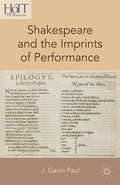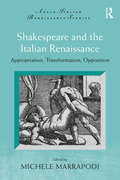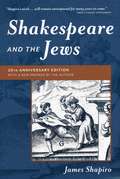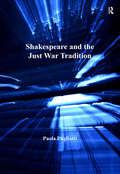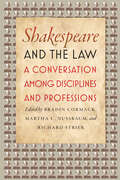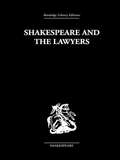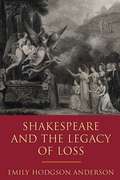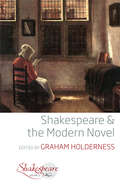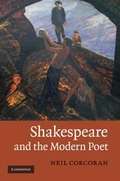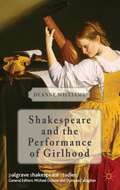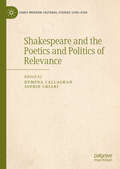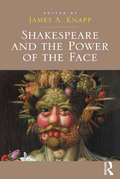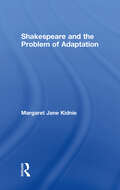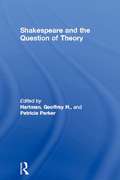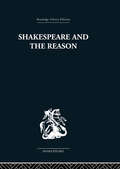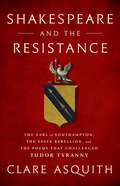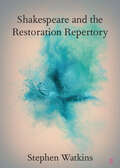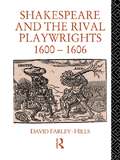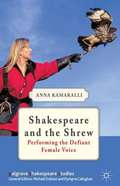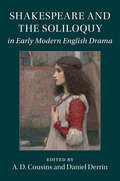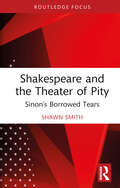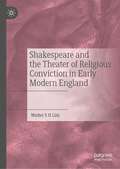- Table View
- List View
Shakespeare and the Imprints of Performance (History of Text Technologies)
by J. Gavin PaulWithin the study of drama, the question of how to relate text and performance—and what interpretive tools are best suited to analyzing them—is a longstanding and contentious one. Most scholars agree that reading a printed play is a means of dramatic realization absolutely unlike live performance, but everything else beyond this premise is contestable: how much authority to assign to playwrights, the extent to which texts and readings determine performance, and the capability of printed plays to communicate the possibilities of performance. Without denying that printed plays distort and fragment performance practice, this book negotiates an intractable debate by shifting attention to the ways in which these inevitable distortions can nevertheless enrich a reader's awareness of a play's performance potentialities. As author J. Gavin Paul demonstrates, printed plays can be more meaningfully engaged with actual performance than is typically assumed, via specific editorial principles and strategies. Focusing on the long history of Shakespearean editing, he develops the concept of the performancescape: a textual representation of performance potential that gives relative shape and stability to what is dynamic and multifarious.
Shakespeare and the Italian Renaissance: Appropriation, Transformation, Opposition (Anglo-Italian Renaissance Studies)
by Michele MarrapodiShakespeare and the Italian Renaissance investigates the works of Shakespeare and his fellow dramatists from within the context of the European Renaissance and, more specifically, from within the context of Italian cultural, dramatic, and literary traditions, with reference to the impact and influence of classical, coeval, and contemporary culture. In contrast to previous studies, the critical perspectives pursued in this volume’s tripartite organization take into account a wider European intertextual dimension and, above all, an ideological interpretation of the 'aesthetics' or 'politics' of intertextuality. Contributors perceive the presence of the Italian world in early modern England not as a traditional treasure trove of influence and imitation, but as a potential cultural force, consonant with complex processes of appropriation, transformation, and ideological opposition through a continuous dialectical interchange of compliance and subversion.
Shakespeare and the Jews
by James ShapiroFirst published in 1996, James Shapiro's pathbreaking analysis of the portrayal of Jews in Elizabethan England challenged readers to recognize the significance of Jewish questions in Shakespeare's day. From accounts of Christians masquerading as Jews to fantasies of settling foreign Jews in Ireland, Shapiro's work delves deeply into the cultural insecurities of Elizabethans while illuminating Shakespeare's portrayal of Shylock in The Merchant of Venice. In a new preface, Shapiro reflects upon what he has learned about intolerance since the first publication of Shakespeare and the Jews.
Shakespeare and the Just War Tradition
by Paola PugliattiBrought to light in this study is a connection between the treatment of war in Shakespeare's plays and the issue of the 'just war', which loomed large both in religious and in lay treatises of Shakespeare's time. The book re-reads Shakespeare's representations of war in light of both the changing historical and political contexts in which they were produced and of Shakespeare's possible connection with the culture and ideology of the European just war tradition. But to discuss Shakespeare's representations of war means, for Pugliatti, not simply to examine his work from a literary point of view or to historicize those representations in connection with the discourses (and the practice) of war which were produced in his time; it also means to consider or re-consider present-day debates for or against war and the kind of war ideology which is trying to assert itself in our time in light of the tradition which shaped those discourses and representations and which still substantiates our 'moral' view of war.
Shakespeare and the Law: A Conversation Among Disciplines and Professions
by Bradin Cormack, Martha C. Nussbaum, and Richard StrierWilliam Shakespeare is inextricably linked with the law. Legal documents make up most of the records we have of his life, and trials, lawsuits, and legal terms permeate his plays. Gathering an extraordinary team of literary and legal scholars, philosophers, and even sitting judges, Shakespeare and the Law demonstrates that Shakespeare’s thinking about legal concepts and legal practice points to a deep and sometimes vexed engagement with the law’s technical workings, its underlying premises, and its social effects. The book’s opening essays offer perspectives on law and literature that emphasize both the continuities and contrasts between the two fields. The second section considers Shakespeare’s awareness of common law thinking and common law practice, while the third inquires into Shakespeare’s general attitudes toward legal systems. The fourth part of the book looks at how law enters into conversation with issues of politics and community, whether in the plays, in Shakespeare’s world, or in our own world. Finally, a colloquy among Supreme Court Justice Stephen Breyer, Judge Richard Posner, Martha C. Nussbaum, and Richard Strier covers everything from the ghost in Hamlet to the nature of judicial discretion.
Shakespeare and the Lawyers
by O Hood PhillipsFirst published in 1972. Shakespeare's writing abounds with legal terms and allusions and in many of the plays the concept and working of the law is a significant theme. Shakespeare and the Lawyers gives a comprehensive survey of what Shakespeare wrote about the law and lawyers, and what has been written, particularly by lawyers, about Shakespeare's life and works in relation to the law. The book first reviews the recorded facts about Shakespeare's life and works, and his connection with the Inns of Court. It then discusses legal terms, allusions and plots in the plays; Shakespeare's treatment of the problems of law, justice and government; his description of lawyers and officers of the law; his references to actual legal personalities; and his trial scenes. Two further chapters consider the criticisms that have been made of Shakespeare's law, and the contribution to Shakespeare studies by lawyers.
Shakespeare and the Legacy of Loss
by Emily Hodgson AndersonHow do we recapture, or hold on to, the live performances we most love, and the talented artists and performers we most revere? Shakespeare and the Legacy of Loss tells the story of how 18th-century actors, novelists, and artists, key among them David Garrick, struggled with these questions through their reenactments of Shakespearean plays. For these artists, the resurgence of Shakespeare, a playwright whose works just decades earlier had nearly been erased, represented their own chance for eternal life. Despite the ephemeral nature of performance, Garrick and company would find a way to make Shakespeare, and through him the actor, rise again. In chapters featuring Othello, Richard III, Hamlet, The Winter’s Tale, and The Merchant of Venice, Emily Hodgson Anderson illuminates how Garrick’s performances of Shakespeare came to offer his contemporaries an alternative and even an antidote to the commemoration associated with the monument, the portrait, and the printed text. The first account to read 18th-century visual and textual references to Shakespeare alongside the performance history of his plays, this innovative study sheds new light on how we experience performance, and why we gravitate toward an art, and artists, we know will disappear.
Shakespeare and the Modern Novel (Shakespeare & #11)
by Graham HoldernessThe Shakespearean novel is undergoing a renaissance as the long prose narrative form becomes reinvigorated through new forms of media such as television, film and the internet. Shakespeare and the Modern Novel explores the history of the novel as a literary form, suggesting that the form can trace its strongest roots beyond the eighteenth-century work of Daniel Defoe, Henry Fielding and Samuel Richardson to Shakespeare’s plays. Within this collection, well-established Shakespeare critics demonstrate that the diversity and flexibility of interactions between Shakespeare and the modern novel are very much alive.
Shakespeare and the Modern Poet
by Neil CorcoranShakespeare is a major influence on poets writing in English, but the dynamics of that influence in the twentieth century have never been as closely analysed as they are in this important study. More than an account of the ways in which Shakespeare is figured in both the poetry and the critical prose of modern poets, this book presents a provocative new view of poetic interrelationship. Focusing on W. B. Yeats, T. S. Eliot, W. H. Auden, Ted Hughes and Sylvia Plath, Neil Corcoran uncovers the relationships - combative as well as sympathetic - between these poets themselves as they are intertwined in their engagements with Shakespeare. Corcoran offers many enlightening close readings, fully alert to contemporary theoretical debates. This original study of influence and reception beautifully displays the nature of poetic influence - both of Shakespeare on the twentieth century, and among modern poets as they respond to Shakespeare.
Shakespeare and the Natural World
by Tom MacfaulExploring the rich range of meanings that Shakespeare finds in the natural world, this book fuses ecocritical approaches to Renaissance literature with recent thinking about the significance of religion in Shakespeare's plays. MacFaul offers a clear introduction to some of the key problems in Renaissance natural philosophy and their relationship to Reformation theology, with individual chapters focusing on the role of animals in Shakespeare's universe, the representation of rural life, and the way in which humans' consumption of natural materials transforms their destinies. These discussions enable powerful new readings of Shakespeare's plays, including A Midsummer Night's Dream, As You Like It, King Lear, Macbeth, The Tempest, The Winter's Tale, and the history plays. Proposing that Shakespeare's representation of the relationship between man and nature anticipated that of the Romantics, this volume will interest scholars of Shakespeare studies, Renaissance drama and literature, and ecocritical studies of Shakespeare.
Shakespeare and the Performance of Girlhood
by Deanne WilliamsThis is the first scholarly study devoted to Shakespeare's girl characters and conceptions of girlhood. It charts the development of Shakespeare's treatment of the girl as a dramatic and literary figure, and explores the impact of Shakespeare's girl characters on the history of early modern girls as performers, patrons, and authors.
Shakespeare and the Poetics and Politics of Relevance (Early Modern Cultural Studies 1500–1700)
by Dympna Callaghan Sophie ChiariFour years on from George Floyd’s murder, this volume asks if and how Shakespeare might be relevant—whether in performance, in the classroom, or in scholarship—to the pressing issues of social and climate justice. This question, however, is accompanied by the acute and uncomfortable recognition that there have been other consequences to the awakening of the world since Floyd's death, including the call to cancel Shakespeare altogether. This volume, however, is not an apology for Shakespeare but rather an engagement with him. From the perspective of the scholars who contribute here, questions about Shakespeare in our current context are not only deeply enmeshed with issues about his historical, geographical, and performance context and its attendant alterity, but crucially also to the specifically literary forms and structures with which he worked. Even as these essays resist the idea of a “timeless,” universalist Shakespeare, they insist upon the “poetics,” the creative framework, the specifically literary dimensions of the plays that cannot be reduced to any paraphrasable content. These are precisely the features that facilitate and enable the “relevance” of Shakespeare’s works even across the chasm of the centuries since he composed them.
Shakespeare and the Power of the Face
by James A. KnappThroughout his plays, Shakespeare placed an extraordinary emphasis on the power of the face to reveal or conceal moral character and emotion, repeatedly inviting the audience to attend carefully to facial features and expressions. The essays collected here disclose that an attention to the power of the face in Shakespeare’s England helps explain moments when Shakespeare’s language of the self becomes intertwined with his language of the face. As the range of these essays demonstrates, an attention to Shakespeare’s treatment of faces has implications for our understanding of the historical and cultural context in which he wrote, as well as the significance of the face for the ongoing interpretation and production of the plays. Engaging with a variety of critical strands that have emerged from the so-called turn to the body, the contributors to this volume argue that Shakespeare’s invitation to look to the face for clues to inner character is not an invitation to seek a static text beneath an external image, but rather to experience the power of the face to initiate reflection, judgment, and action. The evidence of the plays suggests that Shakespeare understood that this experience was extremely complex and mysterious. By turning attention to the face, the collection offers important new analyses of a key feature of Shakespeare’s dramatic attention to the part of the body that garnered the most commentary in early modern England. By bringing together critics interested in material culture studies with those focused on philosophies of self and other and historians and theorists of performance, Shakespeare and the Power of the Face constitutes a significant contribution to our growing understanding of attitudes towards embodiment in Shakespeare’s England.
Shakespeare and the Problem of Adaptation
by Margaret Jane Kidnie'Kidnie's study presents original, sophisticated, and profoundly intelligent answers to important questions.' - Lukas Erne, University of Geneva 'This is a fine and productive book, one that will surely draw significant attention and commentary well beyond the precincts of Shakespeare studies.' - W.B. Worthen, Columbia University Shakespeare’s plays continue to be circulated on a massive scale in a variety of guises – as editions, performances, and adaptations – and it is by means of such mediation that we come to know his drama. Shakespeare and the Problem of Adaptation addresses fundamental questions about this process of mediation, making use of the fraught category of adaptation to explore how we currently understand the Shakespearean work. To adapt implies there exists something to alter, but what constitutes the category of the ‘play’, and how does it relate to adaptation? How do ‘play’ and ‘adaptation’ relate to drama’s twin media, text and performance? What impact might answers to these questions have on current editorial, performance, and adaptation studies? Margaret Jane Kidnie argues that ‘play’ and ‘adaptation’ are provisional categories - mutually dependent processes that evolve over time in accordance with the needs of users. This theoretical argument about the identity of works and the nature of text and performance is pursued in relation to diverse examples, including theatrical productions by the Royal Shakespeare Company, the BBC’s ShakespeaRe-Told, the Reduced Shakespeare Company, and recent print editions of the complete works. These new readings build up a persuasive picture of the cultural and intellectual processes that determine how the authentically Shakespearean is distinguished from the fraudulent and adaptive. Adaptation thus emerges as the conceptually necessary but culturally problematic category that results from partial or occasional failures to recognize a shifting work in its textual-theatrical instance.
Shakespeare and the Question of Theory
by Patricia Parker and Geoffrey HartmanThe theoretical ferment which has affected literary studies over the last decade has called into question traditional ways of thinking about, classifying and interpreting texts. Shakespeare has been not just the focus of a variety of divergent critical movements within recent years, but also increasingly the locus of emerging debates within, and with, theory itself. This collection of essays, written by distinguished and powerful critics in the fields of literary theory and Shakespeare studies, is intended both for those interested in Shakespeare and for those interested more generally in the emerging debates within contemporary criticism and theory.
Shakespeare and the Reason: A Study of the Tragedies and the Problem Plays
by Terence Hawkes'Mr Hawkes is a good critic, oriented towards history of ideas. He operates on the formula that Shakespeare was interested in the available distinctions between discursive and intuitive reason, and disliked a growing tendency for the first to be thought of as manly and the second effeminate. One sees how this action-contemplation polarity works, in Hamlet for instance, and Mr Hawkes thinks the kind of choices forced on tragic heroes can be better understood in terms of it.' Frank Kermode, New Statesman. In the seven plays on which the book concentrates, Terence Hawkes finds Shakespeare investigating the operation of two opposed forms of reason, and constructing dramatic metaphors such as the opposition between appearance and reality, or that between true 'manliness' and its false counterpart, which express to the full the tragic nature of the situation.
Shakespeare and the Resistance: The Earl of Southampton, the Essex Rebellion, and the Poems that Challenged Tudor Tyranny
by Clare AsquithShakespeare's largely misunderstood narrative poems contain within them an explosive commentary on the political storms convulsing his country The 1590s were bleak years for England. The queen was old, the succession unclear, and the treasury empty after decades of war. Amid the rising tension, William Shakespeare published a pair of poems dedicated to the young Earl of Southampton: Venus and Adonis in 1593 and The Rape of Lucrece a year later. Although wildly popular during Shakespeare's lifetime, to modern readers both works are almost impenetrable. But in her enthralling new book, the Shakespearean scholar Clare Asquith reveals their hidden contents: two politically charged allegories of Tudor tyranny that justified-and even urged-direct action against an unpopular regime. The poems were Shakespeare's bestselling works in his lifetime, evidence that they spoke clearly to England's wounded populace and disaffected nobility, and especially to their champion, the Earl of Essex. Shakespeare and the Resistance unearths Shakespeare's own analysis of a political and religious crisis which would shortly erupt in armed rebellion on the streets of London. Using the latest historical research, it resurrects the story of a bold bid for freedom of conscience and an end to corruption that was erased from history by the men who suppressed it. This compelling reading situates Shakespeare at the heart of the resistance movement.
Shakespeare and the Restoration Repertory (Elements in Shakespeare Performance)
by Stephen WatkinsThis Element provides the first comprehensive study of William Davenant's Shakespeare adaptations within the broader context of the Restoration repertory. Moving beyond scholarship that tends to isolate Restoration Shakespeare from the other plays produced alongside it, this Element reveals how Davenant adapted the plays in direct response to the institutional and commercial imperatives of the newly established theatre industry of the 1660s. Prompted by recent developments in early modern repertory studies, this Element reads Restoration Shakespeare as part of an active repertory of both old and new plays through which Davenant sought to realize a distinctive 'house style' for the Duke's Company. Finally, it shows how Restoration Shakespeare was mobilized as a key weapon in the intense competition between the two patent theatres until Davenant's death in 1668.
Shakespeare and the Rival Playwrights, 1600-1606
by David Farley-HillsDavid Farley-Hills argues that Shakespeare did not work in splendid isolation, but responded as any other playwright to the commercial and artistic pressures of his time. In this book he offers an interpretation of seven of Shakespeare's plays in the light of pressures exerted by his major contemporary rivals. The plays discussed are Hamlet, Troilus and Cressida, All's Well That Ends Well, Othello, Measure for Measure, Timon of Athens, and King Lear.
Shakespeare and the Second World War
by Irena Makaryk Marissa MchughShakespeare's works occupy a prismatic and complex position in world culture: they straddle both the high and the low, the national and the foreign, literature and theatre. The Second World War presents a fascinating case study of this phenomenon: most, if not all, of its combatants have laid claim to Shakespeare and have called upon his work to convey their society's self-image.In wartime, such claims frequently brought to the fore a crisis of cultural identity and of competing ownership of this 'universal' author. Despite this, the role of Shakespeare during the Second World War has not yet been examined or documented in any depth. Shakespeare and the Second World War provides the first sustained international, collaborative incursion into this terrain. The essays demonstrate how the wide variety of ways in which Shakespeare has been recycled, reviewed, and reinterpreted from 1939-1945 are both illuminated by and continue to illuminate the War today.
Shakespeare and the Shrew
by Anna KamaralliWhenever Shakespeare wrote a 'shrew' into one of his plays he created a character who challenged ideas about acceptable behaviour for a woman. This is as true today as when the plays were first performed. A shrew is a woman who refuses to be quiet when she is told to be, who says things that people do not want to hear. She is constructed to alleviate male anxieties through ridicule, but like so many objects of comedy or derision, she is full of power because of her very ability to generate these anxieties. 'Shrew' is supposed to be an insult, but has often been used to describe women enacting behaviour that can be brave, clever, noble or just. This book marries an examination of Shakespeare's shrews in his plays with their history in recent performance, to investigate our own attitudes to hearing women with defiant voices.
Shakespeare and the Soliloquy in Early Modern English Drama
by A. D. Cousins Daniel DerrinEncompassing nearly a century of drama, this is the first book to provide students and scholars with a truly comprehensive guide to the early modern soliloquy. Considering the antecedents of the form in Roman, late fifteenth and mid-sixteenth century drama, it analyses its diversity, its theatrical functions and its socio-political significances. Containing detailed case-studies of the plays of Marlowe, Shakespeare, Jonson, Ford, Middleton and Davenant, this collection will equip students in their own close-readings of texts, providing them with an indepth knowledge of the verbal and dramaturgical aspects of the form. Informed by rich theatrical and historical understanding, the essays reveal the larger connections between Shakespeare's use of the soliloquy and its deployment by his fellow dramatists.
Shakespeare and the Theater of Pity: Sinon’s Borrowed Tears (Routledge Focus on Literature)
by Shawn SmithThis volume explores Shakespeare’s interest in pity, an emotion that serves as an important catalyst for action within the plays, even as it generates one of the audience’s most common responses to tragic drama in the theater. For Shakespeare, the word "pity" contained a broader range of meaning than it does in modern English, and was often associated with ideas such as mercy, compassion, charity, pardon, and clemency. This cluster of ideas provides Shakespeare’s characters with a rich range of possibilities for engaging some of humanity’s deepest emotional commitments, in which pity can be seen as a powerful stimulus for fostering social harmony, love, and forgiveness. However, Shakespeare also dramatizes pity’s potential for deception, when the appeal to pity is not genuine, and conceals contrary motives of vengeance and cruelty. As Shakespeare’s works remain relevant for modern audiences and readers, so too does his dramatization of the powerful ways in which emotions such as pity remain essential to our understanding of our shared humanity and of our awareness of compassion’s role in our own private and civic lives.
Shakespeare and the Theater of Religious Conviction in Early Modern England
by Walter S LimThis book analyzes Shakespeare’s use of biblical allusions and evocation of doctrinal topics in Hamlet, Measure for Measure, The Winter’s Tale, Richard II, and The Merchant of Venice. It identifies references to theological and doctrinal commonplaces such as sin, grace, confession, damnation, and the Fall in these plays, affirming that Shakespeare’s literary imagination is very much influenced by his familiarity with the Bible and also with matters of church doctrine. This theological and doctrinal subject matter also derives its significance from genres as diverse as travel narratives, sermons, political treatises, and royal proclamations. This study looks at how Shakespeare’s deployment of religious topics interacts with ideas circulating via other cultural texts and genres in society. It also analyzes how religion enables Shakespeare’s engagement with cultural debates and political developments in England: absolutism and law; radical political theory; morality and law; and conceptions of nationhood.
Shakespeare and the Truth of Love
by James P. BednarzA comprehensive study of Shakespeare's forgotten masterpiece The Phoenix and Turtle . Bednarz confronts the question of why one of the greatest poems in the English language is customarily ignored or misconstrued by Shakespeare biographers, literary historians, and critics.
